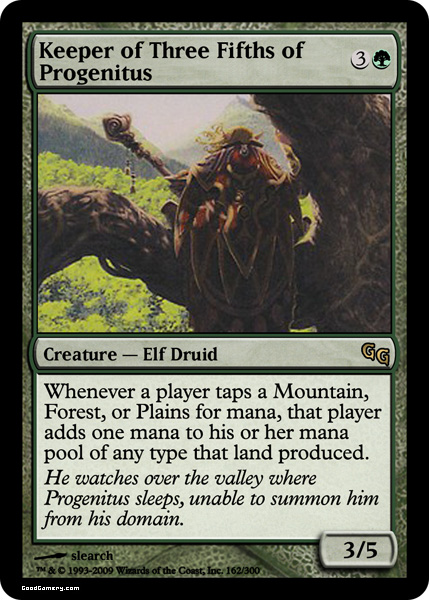
Author: basilisk
-
PT Kyoto Round 2 Report: Destiny Unveiled
Osamu Fujita (Red-White Kithkin) vs. David Irvine (Esper Vark)

Florida native David Irvine grasped his plastic-covered deck carefully and deliberately. He closed his eyes and parted the deck into two relatively equal halves, one in each hand. He then pushed the two halves together at their sides in what is sometimes known as the “side shuffle,” a pragmatic and yet elegent way to quickly redistribute the contents of the deck.
But one was not enough. Irvine’s opponent, Osamu Fujita, watched intently and nervously as Irvine again separated his deck into two parts and pressed them deliberately together, further redistributing the cardboard subcomponents.
But they were not merely cardboard. A song had been stuck in Irvine’s head: the English folk song Greensleeves, for such was the protection he had afforded to his cards. As Irvine side shuffled for an unheard-of third time, spectators attempting to interpret his activity in hushed murmurs, he mentally noted that the version of Greensleeves his mind was humming through had ‘vi’ for its progression-concluding chord rather than the more-common ‘III’. His green, billed cap was upturned at an angle, as if firing a beam of contemplation into the cosmos. The busy sounds of the room surrounding him faded away, and he heard only the imaginary, distant lute, serenading his Sisyphean attempt at true randomization.
Minutes, days, months, years passed. Or so it seemed. But when Irvine opened his eyes again the sounds of reality flooded back into the chamber of sensory acknowledgment. The fantasy lutist had performed his royally-commissioned task and had returned to his fictional forest home. Time rewound itself and Irvine discovered that mere seconds had passed since he first began to shuffle.
Irvine presented his deck to Fujita, and Fujita his deck to Irvine. To each player, the others’ deck felt foreign, unnatural, distasteful. Even evil. They each winced and grunted in discomfort as they shuffled. Each tick of the clock caused an earthquake rated infinity on the Richter scale. The two players sighed a sigh of relief they relieved themselves of their opponents’ decks. Irvine could sense Fujita’s shadowy essence on his sacred possession. Fujita could almost feel Irvine’s fingerprints on his cards. They were each disgusted. Fujita noted that in chess, one never touched his opponent’s game pieces unless they were being captured. This was the way of the samurai. No such honor would be found in this American-made triviality.

Fujita, absurdly adorned in a scarf, glanced over to his dice satchel, then back at Irvine. Irvine did the same. If Fujita acted quickly enough, perhaps he could procure some six-siders before Irvine could react. Sweat began to drip down Irvine’s forehead from the cusp of his cosmic ray brim.
With that, Fujita made his move. In one swift motion he grabbed the lip of the dice satchel with his left thumb and forefinger while reaching inside with his right hand. In an eternal instant he successfully produced three cubic dice from the satchel, each with symbols representing the numbers one through six on their faces. Irvine moved not. Fujita wondered if Irvine had ever even planned to interrupt his dice-procurement maneuver. He would never find out, and the question haunted him for the rest of his Earth-life.
“High roll?” Fujita asked Irvine. Or did he ask the audience? Or the universe? The universe responded through Irvine in the form of a nod. Fujita stood up, the dice in his right hand and, with all of his adrenaline and energy and effort and will and fear and being, launched a salvo of dice onto the table.
Each die ricocheted off of the table in different directions at first. The wind itself seemed to gasp, however, as the dice began to unify their positions mid-air to conform to Irvine’s upturned hat brim. They collided with each other in impossible ways, challenging the observers’ notions of space, time, and self, before tumbling haphazardly to the table below.
The result was dictated by the constitution of the initial singularity which spawned the cosmos combined with rules of conduct hand-scrawled by God in the metaphysical scroll of material existence: A couple of sixes and a two.
Irvine was devastated, but in his devastation something awoke within him. A nihilistic, fatalistic, child-like amusement, like at the beginning of a roller-coaster’s descent from heaven to hell. His inner self chuckled, and soon his outer self joined him, until his guffawing filled the room with the echoes of insanity. He slowly regained his composure and managed to conclude his temporary madness with a cryptic, ominous phrase. “Hoo, that’s a high one!” said he.
It was now Irvine’s turn to roll, but as he touched the dice he sensed the same corruption in these dice as he sensed on Fujita’s cards. He knew with axiomatic certainty that his roll would be lower than 14. What does one do when his prognostication foretells certain doom? He buries himself in the currents of society and world, weeping as his true, inner flesh is ripped asunder by the razor-sharp torrent. He finds himself rolling the dice despite the knowledge of certain failure, allegorically telling the story of every man’s life from protobiont to Julius Caesar to cyborg and beyond.
It was worse than he ever imagined. His own roll wasn’t even a third of Fujita’s, and his slow-as-mollases Esper Vark deck would be starting eternally behind Fujita’s Red-White Kithkin deck, which was so blazingly fast that the cards tapped themselves.
Irvine won the match 2-1.
-
Gwafa Hazid Convicted on Charges of Bribery and Treason
 Feb 26, 2009 – [card]Gwafa Hazid, profiteer[/card] and legendary real estate success, was found guilty by the Supreme Court today of bribery and high treason. Over the past three decades, Hazid navigated the real estate world like none other and brokered trade deals that none thought possible. After a rousing success in the financial field, he later moved on to the political arena as an intermediary negotiator.
Feb 26, 2009 – [card]Gwafa Hazid, profiteer[/card] and legendary real estate success, was found guilty by the Supreme Court today of bribery and high treason. Over the past three decades, Hazid navigated the real estate world like none other and brokered trade deals that none thought possible. After a rousing success in the financial field, he later moved on to the political arena as an intermediary negotiator.“He seemed to know what everybody wanted,” remarked an anonymous source close to Hazid during the Israeli-Palestinian peace accord in 2006. “Instead of playing on Israeli and Palestinian resources, which has never worked, he just offered them a [card]Mountain[/card] and an [card]Island[/card] to stop attacking each other. Unfortunately, as soon as Gwafa hopped on a plane back to the States, they were back at it again.”
According to the source, similar closed-door deals had been struck up nearly everywhere Hazid went, including Bosnia, Tibet, and recently Zimbabwe.
“Zimbabwe was being torn apart by disease and rioting,” commented the source, “but they had all kinds of land already. Gwafa had to offer them something different.” Hazid offered each leader some [card]Healing Salve[/card] to distribute to their people. “I think it only saved about 6 lives, but it mollified them.” Hazid was lauded for his humanitarian efforts in solving the crisis.
With his recent success in Zimbabwe, he was soon put in charge of negotation efforts in Afghanistan. Unfortunately for him, the situation there made his style ineffective.
“Afghanistan consists of a lot of different tribes warring against each other. One [card]Forest[/card] wasn’t going to do it this time. He would need new real estate for each village, something he couldn’t handle. That’s when he got desperate.”
Soon after Hazid’s arrival, Afghani tribesmen were seen using deadlier weapons, such as [card]Death Bomb[/card]s, and even [card]Rocket Launcher[/card]s.
[card]General Jarkeld[/card] of the American forces was quickly being forced into bad combat situations due to the new weaponry. “I’ve tried to outfox them when I can,” remarked the General, “but really, my abilities are pretty worthless here.”
Even after the surge of new troops in Afghanistan arrived, Hazid had his hands full trying to keep each Afghani tribe satisfied. That’s when, some say, he turned to state secrets.
“We understand sometimes you have to go outside the law to get this stuff done,” explained a senior Pentagon official, “a [card]Tropical Island[/card] here, some [card]Grasslands[/card] there. It’s when the enemy shows up with [card]Pyrite Spellbomb[/card]s and whatever the Hell that [card]Progenitus[/card] thing was that we start to have problems.”
In a related development, China was recently found to legally own the [card]Everglades[/card].
-
AoD’s Kyoto Survival Guide
As someone who has lived in Kyoto for several months now, I thought it might be helpful to write a basic guide for the people who are going to the PT. The guide covers transportation, some basic advice, and recommendations (for food, drinking, recreation, sightseeing), and contains some basic Japanese phrases and words at the end.
GETTING AROUND
To Kyoto from KIX: There is a train station
a couple minutes’ walk from International Arrivals. Take the Haruka
train to Kyoto Station. If you have purchased a JR pass, you can use
it to cover this fare; otherwise it will cost 2980 for a non-reserved
seat. The ride takes about 75 minutes. Trains leave on every half-hour,
with the last one departing at 8:30.Within Kyoto:
There are several train and subway lines
in Kyoto, as well as a bus system. I’m only going to list the ones that
I think are important,1) The KEIHAN line goes from Demachiyanagi
station (Imperial Palace, Ginkakuji temple) all the way south to Osaka.
The important stops are Sanjo (shopping, nightlife), Gion-Shijo
(shopping, nightlife, Yasaka shrine, Heian shrine), Kiyomizu-Gojo
(Kiyomizu temple), Fushimi-Inari (Fushimi-Inari Shrine), Tambabashi
(transfer to the Kintetsu line), and Yodoyabashi (a large station
in Osaka, if you plan to go there).2) The KINTETSU line goes from Kyoto
station down to Nara. The important stops are Kyoto (main transportation
hub, shopping), Takeda (the PT venue, one of my favorite izakayas),
Tambabashi (transfer to the Keihan line), and Yamato-Saidaiji
(terminus in Nara if you plan to go there, Saidaiji temple).
3) The HANKYU KYOTO line goes from the
Shijo/Kawaramachi intersection to Osaka. I don’t use it much, but it
does take you to Umeda (a cool part of Osaka). The important stops are
Kawaramachi (a couple minutes down Shijo street from Keihan Gion-Shijo
station), Karasuma (transfer to the Karasuma Subway line at Karasuma
Shijo station), and Umeda (Osaka: shopping, transfer to other
Osaka train lines).4) The KARASUMA SUBWAY line goes from
northeast Kyoto to Takeda, the PT venue. The important stops are
Imadegawa (Imperial Palace), Shijo
(transfer to the Hankyu line at Hankyu Karasuma station), Kyoto,
and Takeda.5) I rarely use the JAPAN RAIL (JR) lines
because the previous ones take me everywhere I usually go, but they’re
important because JR runs the Shinkansen (bullet train), which is the
best way to get to Tokyo, Hiroshima, or any other relatively far destinations
you may visit. JR operates out of Kyoto Station.
6) I don’t have much experience with
the KYOTO CITY BUSES, but there are many routes, and the system covers
most of the important sightseeing, shopping and nightlife sites. The
buses all have their destination and notable stops listed below the
route number at each bus stop, as well as a map showing the routes on
a simple layout of Kyoto’s streets. They’re somewhat slow when compared
to the trains, but cover a wider area. A single ride costs 220, while
a day pass is 500.Important: if you go out at night,
make sure you don’t miss the last train!
Japanese trains end relatively early, and the last one usually departs
around 12 AM, depending on the station and destination. If you don’t
want to pay for a cab (~1500 – 2000, depending on the trip), head back
towards your train station by 11:45. Leave even earlier if your trip
requires a transfer somewhere.PROTIPS
Most people in stores and restaurants
speak limited english, so if you find yourself lost or have questions
about a purchase/meal, you should be alright. Generally, the more traditional
or hole-in-the-wall a place looks, the less chance there is of anyone
speaking english.Police boxes (recognizable from the words
KOBAN and a picture of a policeman riding a horse) are very useful when
you’re lost. Just tell the policeman where you want to go and he’ll
show you on a map.Most convenience stores have incredibly
clean restrooms, so if you need a bathroom while you’re out, just go
to the nearest 7-11/Lawson/Circle-K/Family Mart.If you think you’re near the place you
want to go to but can’t find it, just ask any random by saying the name
of the place you want to go. If you’re close to it, they’ll be able
to point you in the right direction, and some people are nice enough
to walk you there.DOWNTOWN
Virtually all of the following recommendations
for restaurants and bars are in the downtown area of Shijo and Sanjo.
The best way to get there is KEIHAN, using Gion-Shijo
and Sanjo stations.If your hotel is close to the KARASUMA
SUBWAY line, take the subway to Shijo station and transfer to
the HANKYU KYOTO line. Take Hankyu to Kawaramachi station, and
you’ll be in Shijo.If your hotel is close to the KINTETSU
line, take the train to Tambabashi and transfer there to KEIHAN,
then take the Keihan train to Gion-Shijo
or Sanjo station.If your hotel is close to the HANKYU
KYOTO line, just take the train to Kawaramachi station, and you’ll
be in Shijo.RECOMMENDATIONS
I’m a college student on a budget, so
here are some pretty good places that may not blow your mind but definitely
won’t bust your wallet. This is by no means an exhaustive list of all
that Kyoto has to offer; these are just the places I like and frequently
visit.FOOD
Kyoto is full of all sorts of restaurants,
but be warned that most "foreign" food is a Japanized version.
Some places specialize in tabehoudai (all you can eat buffet);
if no sign mentions it, don’t be afraid to ask.Unlike American ones, Japanese convenience
stores are full of surprisingly high-quality food for cheap. Beyond
regular snack foods, you can get fried food, meat buns, sushi, rice
balls, sandwiches, bento (Japanese box-lunches) and even pasta
that the cashier will microwave for you. Convenience stores are all
open 24/7.Fast food: Many fast food joints in Japan
are open 24/7, and the food is generally much higher-quality than food
of a comparable price in the US. Aside from McDonald’s, Japan has:Mos
Burger – A tastier and more expensive burger chain than McDonald’s,
but the portions are somewhat small. A set is ~600-800, depending on
the burger.Sukiya
– Japanese rice bowls, curries, and traditional side dishes in the 300-600
range.Matsuya
– Like Sukiya, but with more emphasis on the rice bowls and less on
the curry. Rice bowls are from ~350 to 500.CoCo
Curry – Japanese curry with rice. Wide variety, tasty, runs from ~600-1000.Shakey’s
Pizza – For those brave enough to try Japanese pizza, Shakey’s is the
place to go. Shakey’s offers "Lunch Viking" and "Dinner
Viking," which is an odd way of saying "all you can eat buffet,"
for stupidly cheap – lunch for ~650, dinner for ~850. In addition to
pizza, you can also get curry rice, pasta and salad. Try the banana
chocolate dessert pizza; it’s actually pretty good. Shakey’s pizza is
on Teramachi, between Shijo and Sanjo streets (for how to get
to Teramachi, look at the SHOPPING section).Sushi: It’s hard to go wrong with the
sushi here, but unless you get it from a convenience store it will be
relatively expensive (compared to other options). The two sushi places
I usually frequent represent opposite sides of the quality/quantity
argument, and are both on Sanjo street.Ganko-zushi
– From Keihan Sanjo station, cross the bridge west towards Starbucks,
on the right-hand side of the street. Continue past Starbucks and you’ll
soon be in front of Ganko-zushi, recognizable by its logo of a serious-looking
sushi chef’s head. The food is very good, and the sashimi’s quality
is excellent, but expect to pay a minimum of 2000 yen if you don’t want
to leave hungry. They have an English menu.Kappa
Sushi – Follow the same directions as Ganko-zushi, but continue along
down Sanjo street until the street ends. As soon as you cross Kawaramachi
street, Kappa sushi will be on the left-hand side, recognizable by its
logo of a cute vaguely-turtleish green cartoon character dressed up
like a sushi chef. Kappa Sushi is a kaitenzushi (conveyor-belt
sushi) establishment. After you’re seated, you can freely grab sushi
as it comes by on small trays. You can also place a special order using
the touch screen at each table, and the food will come on a minature
bullet train. Just remember to press the red button to send the train
back! Most plates have 2 pieces of sushi and cost 105 yen.
Okonomiyaki: Also called "Japanese
pizza," okonomiyaki is a pancake-like batter filled with various
vegetables and meat/seafood and cooked on a hot plate. Okonomiyaki restaurants
may not have a sign in English, but the Japanese looks like this: お好み焼き. You
can’t go wrong with buta (pork) or niku (beef), and for
those who like seafood there’s ika (squid) and ebi (shrimp).I
forget the name – From Keihan Sanjo station, cross the bridge
west towards Starbucks, on the left-hand side of the street. Continue
until you reach an intersection with a light (Sanjo and Kiyamachi),
and turn left onto Kiyamachi street. Walk down Kiyamachi on the left-hand
side of the street until you see a 7-11. Next to the entrance of the
7-11 there is an elevator, and next to the elevator are a bunch of signs,
including one for okonomiyaki. Go to the floor that sign advertises.
The okonomiyaki will be about 800-1000 on average.
Ramen: Ramen shops are as delicious as
they are ubiquitous. Recognize them by the Japanese ラーメン or らーめん. The basic shoyu ramen (soy-sauce ramen)
will cost between 500-700, and is very filling. Gyoza (chinese
pot-stickers) make a good side dish, and should be between 200-300 for
5 or 6.DRINKING
Japan is a great place to get drunk.
There are no penalties for public drinking or public drunkenness, so
as long as you aren’t being an obnoxious dickhead you’ll be fine. There
are a couple main types of drinking establishments in Japan:The izakaya – the Japanese characters
for izakaya literally translate to "eat drink store,"
and that’s what you’ll do. Izakaya are the traditional bars of
Japan, with a food menu full of authentic Japanese fried and grilled
dishes and a hybrid drink selection consisting of sake (rice
wine) and shochu (potato liquor, somewhat similar to vodka) alongside
the usual beer and mixed drinks.The bar – your usual bar; cocktails and
mixed nuts.Undoubtedly, the best thing about drinking
in Japan is nomihoudai (all you can drink buffet). Instead of
paying for drinks, you pay a fixed price for 1.5 to 3 hours of as many
drinks as you can have. Some places charge extra to include beer as
part of the buffet. Not all bars offer nomihoudai, so be sure
to ask. Also, beware that some places underhandedly limit the number
of drinks you have, through slow service or watery drinks.
A Bar: One of my favorite bars in Kyoto,
A Bar has reasonably priced Yebisu beers, good food selection, and a
great atmosphere. Instead of the usual setup, there are several smaller
booths with a huge table in the center. Sharpie grafitti left by prior
celebrants covers the walls, and on weekends it’s hard not to make new
friends, whether Japanese or fellow foreigners. A large beer will run
you ~600, and mixed drinks are 500. From Keihan Shijo
station, cross the bridge west toward McDonalds. Make a right onto Kiyamachi
street, and cross over to the left (far) side of the river on Kiyamachi.
Pass club world, and go straight into the alley. Continue straight into
the next alley until you see the sign for A Bar on your left, on the
second floor.Cafe La Siesta: My other favorite bar
in Kyoto, Cafe La Siesta is a gamer’s paradise. The music is always
8-bit, a Super Street Fighter 2 machine sits next to the bar, and there’s
a giant Game Boy with a TV inside hooked up to a NES with a sizable
collection of the best games. The Thai curry (700) is great, and while
original drinks named 1-Up, Bonus Stage and Continue start at 600, you
can get 1.5 hours of nomihoudai for 2100. The service is usually
fast, the owners are good people, and you can request the drinks strong.
The directions are the same as A Bar, but Cafe La Siesta is on the first
floor instead of the second.Jidaiya: This izakaya chain is
probably the best drinking deal in town. Located right next to Takeda
station, Jidaiya has great, cheap traditional Japanese bar snacks, but
the real draw is 1.5 hours of nomihoudai for 900 yen. Try the
yakitori (grilled chicken sticks); they’re delicious, and a steal
at only 80 yen a stick. For nomihoudai, you have to reserve in
advance; it fills up quickly on weekends, so the sooner you figure out
how many people and when, the better. Also, they speak very limited
English, so you might want to have a Japanese judge reserve for you.
The number is 075 622 0765. I don’t remember exactly what exit it’s
next to, but if just say "Jidaiya? Izakaya?" to an employee
at Takeda station, they’ll be able to direct you.
Seagulls: While they also offer food,
the main draw for Seagulls is getting as smashed as possible. 3 hours
of nomihoudai costs 2000 (2300 with beer included), but you can
order your drinks strong. Be sure to order a drink whenever you receive
one, as the service can be a bit slow unless you’re insistent about
getting your way. From Keihan Sanjo station, cross the bridge
west towards Lawson. Make a left onto Kiyamachi street, and continue
straight until you see an izakaya called "Watami" on
a corner on the right-hand side of the street. Turn right and walk straight
past the Watami and the bowling alley. Seagulls will be on the right
side of the street on the 3rd floor, across from the Hub.
SHOPPING
Things are more expensive here than in
America, but there are many stores where you can shop duty-free. Otherwise,
check out the outdoor shopping arcades of Teramachi and Shinkyogoku
in Sanjo/Shijo.Kyoto Station: Kyoto station is a huge
complex of restaurants and stores, with an underground mall. If you
want to buy things duty-free, go to Bic Camera for a giant selection
of electronics.Teramachi/Shinkyogoku: The shopping arcades
of Teramachi and Shinkyogoku, bordered by Sanjo street at the north
end and Shijo street in the south, offer the best shopping in Kyoto.
Lined with stores, restaurants and even a couple game centers, there’s
little you won’t be able to find. To get to Teramamachi and Shinkyogoku:From
KEIHAN Sanjo station, cross the bridge west towards Lawson. Continue
going straight along Sanjo street until the street becomes a dead end.
Cross the street, and walk into the covered walkway. The arcades will
trail off to the left; the nearer one is Shinkyogoku, and the further
one is Teramachi.From
KEIHAN Gion-Shijo station, cross the bridge west towards McDonalds.
Continue straight along Shijo street until you see a sign on your right
for Shinkyogoku; if you go a bit further, you will see a sign on your
right for Teramachi.From
HANKYU Kawaramachi station: Kawaramachi station has many exits.
Take any of the exits that lets you out on Shijo Street, and from there
walk west down Shijo street until you see the signs for Shinkyogoku
and Teramachi. If you accidentally find yourself exiting into the Takashimaya
department store, you can ask any of the workers to direct you to Shijo
street.Taniyama Electronics Store: Like Bic
Camera but smaller, Taniyama is a several-story shop where you can buy
electronics, and the entire 5th floor is duty free. To get
there, follow the same directions as for getting to Teramachi from
Gion-Shijo or Kawaramachi stations, but when you get to the
sign that says “Teramachi,” instead of going into the arcade, go
the opposite direction down the street. Taniyama will be on your right
after a short walk.RECREATION
Karaoke: Japanese karaoke centers are
multi-storied affairs with private rooms for each party, room service
for food and drinks, and large song selections. If you’ve never tried
it, you really should—anyone who has played Rock Band knows the awesome
fun of singing poorly to your favorite music. Songs you must try: “Welcome
to the Jungle,” “Say It Ain’t So,” and “Snake Eater Song”
from MGS3. They’re virtually everywhere, but if you don’t
see “Karaoke” in English, you can recognize a karaoke center by
the Japanese カラオケ. You pay by the hour, and the cheapest times
are from around 12 PM to around 5 PM.Game Centers (Arcades): If you have an
absurd craving to get your ass kicked at Street Fighter IV, there are
two good arcades in the Shijo/Sanjo downtown area.Round
1 is a large complex with ticket games, air hockey and crane games aside
your usual fighters, racers and gun games. From KEIHAN Sanjo
station, cross the bridge west towards Lawson. Continue straight down
Sanjo street until the road ends at Kawaramachi street. Cross to the
dead-end side, and turn left. Walk south down Kawaramachi street towards
Shijo street. After a short walk, Round 1 will be on your right. The
real games are all from the 3rd floor up. Most games are
100 yen per play, but SFIV gives you two plays.For
the hardcore, Amusement A-Cho on Teramachi street is a no-nonsense
arcade stacked with almost every major fighter from the last two decades.
The competition is much better than at Round 1, so don’t be surprised
if you lose. A lot. To get there, follow the directions for Teramachi
street from Gion-Shijo station. Enter Teramachi, and after a
short walk you will see a sign for Amusement A-Cho high up on your right.
Go up the escalator, and you’ll be on the gaming floor. Most games
are 50 yen per play.Clubs: The downtown area has more than
a few clubs, but I’ve only been to a couple of them. Japanese dancing
etiquette is different, as people often dance by themselves, and depending
on the place may not be as receptive to your advances as they would
in America. Be courteous, get drunk and rock out.
Sam & Dave: This gaijin-owned
chain is very popular in Kansai (western Japan), and its Kyoto
location is on Kiyamachi street between Sanjo and Shijo, close
to 7-11 and the okonomiyaki restaurant. Entry for men is 2000 and comes
with 2 drink tickets. The first floor has a pool table, and the second
floor is the main dance area. Sam & Dave is known for its foreigner
population, so you’ll see a lot of other gaijin as well as
questionable Japanese girls looking to hook up with said gaijin.
Club World: The biggest club in Kyoto,
Club World is classier, has better music, and is frequented by fewer
gaijin than Sam & Dave. However, the entry is a hefty 3000 yen,
and only comes with 1 drink ticket. From Gion-Shijo
station, cross the bridge towards the McDonalds. Turn right at the first
intersection (Kiyamachi street), and walk down Kiyamachi on the left-hand
(far) side of the river. You will soon be at Club World.
SIGHTSEEING
While the Pro Tour will take up most
of your time, this may be the only chance you have to come to Japan,
and it’d be a shame not to see one of the many beautiful, easily accessible
cultural spots in Kyoto.Kinkakuji: Also known as the Temple of
the Golden Pavilion, this gilded Buddhist temple sits atop a placid
pond. It’s a bit out of the way, but well worth it. Admission is ~500.
To get there, take the 101 or 205 bus from Kyoto Station (or
any stop along the way). Alternately, a faster method is to take the
KARASUMA SUBWAY line to Kitaoji station, and take a bus or taxi
from there to Kinkakuji.Ginkakuji: Although the name literally
translates as “Temple of the Silver Pavilion,” Ginkakuji is actually
a wooden structure. While it’s currently under construction, the real
draw is the traditional walking garden path that winds through the carefully
sculpted grounds. Admission is ~500. To get there, take the 5, 17 or
100 bus from Kyoto Station. If you’re already near a KEIHAN
station, it’s a better idea to take the train to Demachiyanagi
station, and take one of the same buses from there.
Kiyomizu-dera: Sitting on a hill, the
beautiful Kiyomizu temple offers a great view of Kyoto. One of the older
temples in Japan, Kiyomizu-dera is known for its sacred water that is
purported to bring longevity, wisdom, and health. Lesser-known but close
by lies a massive Japanese graveyard with stones dating back to the
mid-1800s. From KEIHAN Kiyomizu-Gojo station, walk west towards
the row of convenience stores. Continue straight along Gojo street until
you come upon a diagonal cross-street and a steep hill straight ahead.
Go up the hill; Kiyomizu-dera is a the top.Fushimi-Inari Taisha: My favorite place
in Kyoto, Fushimi-Inari shrine offers a pleasant hike and some valuable
silence, both of which are relatively hard to come by in Japan. The
main shrine for the god of fortune, Fushimi-Inari is a hill criss-crossed
with dozens of paths that are lined with 10,000 red gates in total.
Along the hike, you’ll encounter many side paths leading to shrines
of various sizes, and countless statues of foxes in red bibs. The shrines
at the top of the hill are full of friendly cats, and I highly recommend
making the whole circuit. The best time to go is at sundown; hundreds
of lamps illuminate the mountain, and you won’t run into to too many
other people. From KEIHAN Fushimi-Inari station, head across
the train tracks going uphill. Just follow the path straight, and go
in the same direction as the other tourists. Make sure you don’t get
lost on the mountain; the paths can be confusing. Trivia: While hiking
at Fushimi-Inari, the idea of foxes in red bibs flying through gates
inspired Shigeru Miyamoto to create Starfox.FOR THOSE OF YOU WHO WANT TO TRY: BASIC
JAPANESEJapanese is a fairly difficult language,
and the grammar is very different from that of English. Here’s a basic
pronunciation guide, a list of important questions and phrases, and
a list of words you can substitute into said sentences.
Pronunciation: Japanese pronunciation
is much simpler than you might imagine. There are five vowels: A, I,
U, E, and O.A is pronounced ah, as in law or saab.
I is pronounced ee, as in feed or knee.
U is pronounced ooh, as in you or do.
E is pronounced ay, as in play or way.
O is pronounced oh, as in low or dough.
All the consonants are similar to those
in English, with the exception of:“R” sounds like a mix of L and R;
try saying “R” while touching the tip of your tongue to the roof
of your mouth.“F” sounds like a mix of F and H;
try saying “F” without touching your upper teeth to your lower lip.
Additionally, Japanese uses “Tsu,”
which is pronounced how it is written.“J” is ALWAYS pronounced like J as
in “jam” or “jump”.Useful sentence Patterns:
WHERE: _______ wa doko desu ka? (where
is ___?)HOW MUCH: _______ wa ikura desu ka?
(how much is ___?)DIRECTIONS: _______ ni dou ikimasu ka?
(how do I get to ___?)DO YOU HAVE: _______ wa arimasu ka?
(do you have/is there ___?)WHEN: ______ wa itsu desu ka? (when
is ___?)Useful phrases:
Konnichiwa. (Hello)
Jaa ne! (Goodbye!)
Arigatou. (Thank you.)
Onegaishimasu. (Please.)
Sumimasen. (Excuse me.)
Gomen nasai. (Sorry.)
Eigo o hanasemasu ka? (Do you speak
English?)Nihongo o hanasemasen. (I don’t
speak Japanese.)Useful words:
Places:
Train station: Eki
Toilet: Toire
Convenience Store: Konbini
Bar: Izakaya, Baa
Restaurant: Resutoran
Police Box: Koban
Bakery: Panya
Sushi restaurant: Sushiya
Bookstore: Honya
Arcade: Geemu Senta
Japan: Nihon
Japanese (language): Nihongo
Japanese (person): Nihonjin
Things:
Train: Densha
Taxi: Takushii
Food: Tabemono
Drinks: Nomimono
Alcohol: Sake
Beer: Biiru
Lunch: Hirugohan
Dinner: Bangohan
END
I hope some of this has been useful.
This basic guide is by no means exhaustive, and I can already think
of a few cool things I haven’t even had the time to write yet, but
it should help you get around reasonably well. Good luck in the PT!
P.S.: If I know you from GG or MT and
you’d like my number for emergency contact or general information
purposes, send me a request via GMail at srosenblum. -
Designing While Asleep at the Wheel?
Wizards Preemtively Bans Five Cards from Fall 2009 Set
 In a surprise announcement, Wizards of the Coast (WotC), a Hasbro subsidiary (NYSE: HAS), has banned five cards from their upcoming block, codenamed “Live/Long/Prosper”. While still intending to print, package, and distribute these five cards, they are henceforth illegal in all formats (including casual, internal testing leagues, and all draft formats), due to their game-warping abilities. According to Mark Rosewater, a WotC designer, the decision was made “after careful consideration of the five’s current and future effect on the game, as well as the design team’s desire to not design any more cards for this block.”
In a surprise announcement, Wizards of the Coast (WotC), a Hasbro subsidiary (NYSE: HAS), has banned five cards from their upcoming block, codenamed “Live/Long/Prosper”. While still intending to print, package, and distribute these five cards, they are henceforth illegal in all formats (including casual, internal testing leagues, and all draft formats), due to their game-warping abilities. According to Mark Rosewater, a WotC designer, the decision was made “after careful consideration of the five’s current and future effect on the game, as well as the design team’s desire to not design any more cards for this block.”When pressed further as to why the design team decided to waste five slots with so obviously broken cards in a set that hasn’t even made it to the printers yet, Rosewater, with anger in his voice, said, “[…] and we are expected to design three sets a year. Three sets. Do you realize how many cards that actually is? I can’t even count them it’s so many (he is gesturing wildly with his arms here — ein). And players are expecting cards with mechanics they’ve never seen before, in addition to all their favorite old mechanics, and of course more gold cards. We just don’t have enough time to come up with good ideas, so sometimes powerful cards slip through the cracks unnoticed. You would probably like it if every card were as balanced as [card]Tolarian Academy[/card], [card]Astral Slide[/card], [card]Scryb Sprites[/card], and [card]Skullclamp[/card], wouldn’t you? Good design takes time man.”
What then, you may be curious, do these cards actually do? In another rare misstep, the WotC website, magicthegathering.com (you must click the link below the balls or you can”t get past them) accidentally released the pending Oracle text of each of the cards in the announcement of their banning. They are listed here in their entirety:
Gambling for Fun (and Profit)R
Enchantment
During your upkeep flip two coins.If you win both of those flips, yYou win the game.Some people will only gamble on a sure thing. Some people don’t understand “gambling”.
Catch Them AllU
Enchantment
If at any time you control all the creatures in play, you win the game. (if there are no creatues in play, you still win the game)Having toughness and determination is good and all, but killing your opponent before the fight starts is better.
Eager DefenseW
Enchantment
During your upkeep, if you control two or more creatures, and none of those creatures have a toughness greater than 1, you win the game.Putting your kids on the front line shows you’re serious.
The Benefits of Home OwnershipG
Enchantment
If mana from a basic forest was spent to play this card, you win the game.Don’t worry, it may not look like much but it’s rent-controlled.
The Death of IntelligenceB
Enchantment
If, during your upkeep, you have fewer cards in your hand than your opponent, you win the game.Getting ahead isn’t about having the most knowledge, it’s about ramming your agenda through by force.
“We thought these cards would liven up the game, and since [card]Battle of Wits[/card] was so well received, we thought we’d try again. But BoW decks are big and complicated to play, and require lots of time to shuffle, so we wanted to do this series so that the conditions were easier to fulfill.” Rosewater explained. He went on, “Were the new ones too easy to fulfill? Since they’re banned, I guess we’ll never know for sure, will we?”
You may be wondering why the Future League or Future Future League failed to expose the power of these cards. According to Rosewater, “Seriously? You’re surprised this wasn’t caught? I’m pretty sure I’ve mentioned before that everyone here thinks enchantments are jokes. No one plays those things.”
-
A Delicious New Plane Awaits
Good news everyone! Our operatives have returned from the time rift and have come up with a partial spoiler from the set code named “Live!” Many Bothans died to bring us this information.
Turns out, the set is really called “Delis of Gastronomica” and the set’s theme focuses on a powerful new card type! Without further ado…
White
Ham Sandwich on Wonder Bread – W
Sandwich – Delicious (Common)
Eat – Put 2 +1/+1 counters on the creature that eats this. (To eat a sandwich, tap an untapped creature you control and sacrifice the sandwich.)Hungry Cadet – W
Creature – Human Soldier (Common)
Whenever Hungry Cadet eats a sandwich, put a +1/+1 counter on it.
“Plains, this guy, go.”
1/1Virtual Time Walk – 1W
Sorcery (Uncommon)
Untap target creture that ate a sandwich this turn.
Draw a card.
“Okay Flores, this time you’re really stretching it.”Hypochondria – 2W
Enchantment (Rare)
Your life total is 10 more than you think it is.Red
Buffalo Chicken Sandwich with Bacon – 1R
Sandwich – Delicious (Common)
Eat – The creature that eats this sandwich gets +4/+0 and first strike until end of turn. (To eat a sandwich, tap an untapped creature you control and sacrifice the sandwich.)Ironclaw Sandwichsmith Czar – 2RR
Creature – Orc Gourmand (Common)
When Ironclaw Sandwichsmith Czar comes into play, you may search your library for a delicious sandwich and put it into play.
2/3Sauté – 2R
Sorcery (Common)
Sauté deals 5 damage to target player over a period of 2 to 3 minutes until they are a deep golden brown.Blue
The One Sandwich to Rule Them All – 1UU
Legendary Sandwich – Delicious (Mythic)
Eat – The creature that eats this sandwich becomes unblockable, has shroud, and refuses to share it with anyone because it is a dick. (This effect does not end at end of turn.)The Ultimate Crime of Unforgivable Sin – U
Sorcery (Rare)
Gain control of target sandwich.Your Cake – 2UU
Sorcery – Arcane (Common)
Choose one – Have Your Cake, or eat it.
Entwine: THERE IS NO ENTWINE.Distant Jingle – 3U
Instant (Common)
Draw cards equal to the highest converted mana cost among sandwiches you control.
“Five dolla foot looooooooong!”Scornful Egosandwich – 8U
Sandwich – Surly (Uncommon)
Eat – Return the creature that eats this to its owners hand. (To eat a sandwich, tap an untapped creature you control and sacrifice the sandwich.)
Morph UGreen
Bizarrogoyf – 1G
Creature – Lhurgoyf (Rare)
Bizarrogoyf gets -1/-1 for each card type among cards in all graveyards. (The card types are artifact, creature, enchantment, instant, land, planeswalker, sorcery, tribal, and sandwich.)
9/10Sandwich of Oaks – 3G
Sandwich – Not-Terribly-Delcious (Uncommon)
Eat – Put 7 +1/+1 counters on the creature that eats this. (To eat a sandwich, tap an untapped creature you control and sacrifice the sandwich.)Famished Famished River Horse – 3GG
Creature – Hippo Rogue (Common)
Trample
When Famished Famished River Horse deals combat damage to a player, you may have it eat target sandwich that player controls.
4/4Relentless Groffskithur – 5G
Creature – Beast (Common)
Whenever Relentless Groffskithur becomes blocked, you may return target card named Relentless Groffskithur from your graveyard to your hand.
A deck can have any number of cards named Relentless Groffskithur.
3/3Colossal Sandwich – 2GG
Sandwich – Shapeshifter (Rare)
Changeling (This sandwich is all sandwich types at all times.)
Eat – The creature that eats this sandwich gets gains protection from black and +X/+X until end of turn, where X is its power.Form of the Hoagie – 1G
Enchantment (Mythic)
You can’t cast spells.
You can’t be the target of spells or abilities your opponents control.
Creatures you control have: “T: You lose the game.”Black
Dumpster Diver – 3B
Creature – Human Programmer (Common)
When Dumpster Diver comes into play, you may return a sandwich from a graveyard to play under your control.
“Hey, this sandwich is still good! It’s not gluten free though…”
2/3Word of Command of Make Me a Sammich – BB
Sorcery (Rare)
Search target player’s hand and library for a sandwich card and put that card into play under your control. That player must draw as much mana as possible from lands he or she controls to pay for the sandwich.
If the target player is of the opposite sex, search for two sandwiches instead.Broodwich – 3BB
Legendary Sandwich – Demon (Mythic)
Eat – The creature that eats this sandwich gains “Whenever this creature deals combat damage to a player, that player loses the game.” (This effect does not end at end of turn. Also, you just lost the game.)
“Mmmm, sun dried tomatoes.”Mayor McCheese – 2BB
Legendary Sandwich Creature – Delicious Human (Rare)
Eat – Cause civil unrest in McDonaldland. We’re pretty sure that any human creature that eats this guy counts as a cannibal and is a sick fuck.
3/3Fuck You Elemental – BBBBB
Creature – Elemental Asshole (Rare)
1B, Sacrifice Fuck You elemental: You and target player both lose the game.
Remove Fuck You Elemental from your deck before the game if playing with fewer than 3 players.
PS, you just lost the game again.
6/6Land
Brass Land
Land (Rare)
Add 1 to your mana pool.
Brass Land does not untap during your untap step.
1: Untap Brass Land. Play this ability only during your upkeep.Hill From the Sound of Music
Land – Terranthrope (Uncommon)
Hill From the Sound of Music comes into play tapped.
T: Add G to your mana pool.
2GG: All terranthropes you control become 4/4 creatures with trample. (This effect doesn’t end at end of turn.)Multicolored
Irony – 2UG
Creature – Incarnation (Uncommon)
Trample, Unblockable
When Irony is in your graveyard, creatures you control have trample and are unblockable.
“It’s like raaaaaaaain…”
3/2Nicol Bolas, Plainswalker – 2UUBBRR
Legendary Creature – Elder Dragon (Mythic)
Plainswalk
7/7Artifact
Concrete Rockin’ Moroccan – 7
Legendary Artfact Sandwich – Delicious Grinder Equipment (Rare)
Equip: 3
Equipped creature gets +4/+4 and may eat the Concrete Rockin’ Moraccan if it is tapped.
Eat – The creature that eats this sandwich gets +9/+0 until end of turn. Sacrifice it at end of turn.Brown Paper Bag With Your Name on It – 0
Artifact (Uncommon)
Sandwiches you control have shroud. -
Good Gamery St. Patrick’s Day Contest

Greetings :vulcan hand greeting:. My name is Spock, of the Vulcan race. I am from the 23rd century — the Year of Our Lord 2295, to be exact. That’s correct. I am… from the future.
 I have boldly come to this time, in the distant past, for I am on a mission. That mission is to travel to 1930s Dublin, to be painted by Harry Kernoff in a piece entitled “A Bird Never Flew on One Wing.” If I do not create a casual explanation for this anomalous painting, we’ll be stuck in a doomed tangent universe a la Donnie Darko. It also, logically, sounds like a raging fun way to spend St. Patrick’s Day.
I have boldly come to this time, in the distant past, for I am on a mission. That mission is to travel to 1930s Dublin, to be painted by Harry Kernoff in a piece entitled “A Bird Never Flew on One Wing.” If I do not create a casual explanation for this anomalous painting, we’ll be stuck in a doomed tangent universe a la Donnie Darko. It also, logically, sounds like a raging fun way to spend St. Patrick’s Day.Along the way, however, I intend to help Good Gamery spoil the contents of this fall’s Magic: The Gathering block, nicknamed “Live/Long/Prosper.”
See that temporal anomaly over there? Right there :points at the wall:. I invite all to enter into it and travel to the future, for this anomaly is a portal into the future. There you will extract information about this fall’s block. You may write your own report. Or you might brave the labyrinthine depths of magicthegathering.com to extract articles. Either way, you will return and submit this content to he who is the head administrator at Good Gamery, via forum PM (“paz”) or via gmail (“extremestan”). Logically, you may even submit multiple items.
(In other words, this contest asks that you submit humorous content regarding the cards, flavor, or development of this fall’s block, currently known only as “Live/Long/Prosper.”
Or, you know, you can write about something else that’s funny or strategic. That’ll count too.)The persons who accomplish this task most excellently, as voted upon by their peers, will receive material compensation. This is, I hear, what compels people in this primitive age.
- 1st place: Three “Shards of Alara” boosters and one of “[card]Tezzeret, the Seeker[/card],” “[card]Birds of Paradise[/card],” “[card]Burning Wish[/card],” or “[card]Living Wish[/card]”
- 2nd place: Three “Shards of Alara” boosters and one of the remaining three of the above cards
- 3rd place: Three “Shards of Alara” boosters and one of the remaining two of the above cards
- 4rd place: Three “Shards of Alara” boosters and the remaining card of the above cards
There’s one catch. Logically, every time this content is published, the future will be altered. Thus, published items may not be consistent with one another. And this content is not predestined to be related to your science fiction mythos “Star Trek,” of which I know nothing. Though it can possibly be related. I am uncertain.
Logically, it’s time for you to enter the temporal anomaly and submit some content. The contest will end around St. Patrick’s Day, with submitted content being published all along the way. Take heed when I say that the state of the universe is depending on you taking part, for better or for worse, logically.
-
Point/Counterpoint: Powerstone Minefield vs. Mobilization
 Uh Oh, Something Feels Wrong
Uh Oh, Something Feels WrongSomething doesn’t feel right. I haven’t felt good for a while now. I suppose one could think it odd for a landscape to have an illness, but I assure you, I have one. Could this be due to the impending flip of Earth’s magnetic poles? Regardless, something is off. None of my grass is still alive and all the rabbits and foxes that used to live in burrows on my land are torched beyond recognition. Even the carrion birds that would like to eat those crispy little critters are staying away.
*cough* *cough*
Hmmm, I don’t sound very good. Maybe I should take a nap. Yeah, a nap sounds pretty good. I hope for everyones sake I am not disturbed by that ominous looking mass of people off to my left. They are in for a rude surprise if I am disturbed while napping.
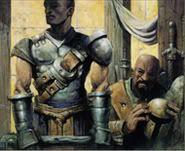 Retreat, Men, Retreat… OH NO, IT’S TOO LAaaaaaaaa… IT BURNS!
Retreat, Men, Retreat… OH NO, IT’S TOO LAaaaaaaaa… IT BURNS!A soldier a turn, that’s pretty good right? Eventually, we’re going to build up to two soldiers a turn, and then… look out! Until then, I should put another token into play. Building an army has never been easier. Well, never been easier if you’re not a thallid that is. But, I digress. There is work to be done. We thus far can’t outfit our soldiers with anything more than the swords on their backs. I’ve been fighting so long, I can’t even remember who we’re fighting against. No matter, I’m just here to make soldiers; guess I’ll put another one into play. I wonder what these guys do all day? I’ve heard of other armies putting their skulls in clamps, but what good does that do? Motivation? I highly doubt that. The poor people they put in there end up in mass graves, or so I’ve heard.
Oh, wait… what’s this? The call to attack? This must be it! I am so proud of all of you men, I just wanted you to know. Mind what you have learned, save you it can. One of you needs to stay back and guard the fort, right? Oh, right, I will just make another to guard. Nevermind.
Is that screaming I hear? What is going on over there?
That is screaming! Oh no! My poor soldiers, they are dying and dying. And for what? They haven’t done anything to anyone. I think I might cry. Please make it back to me safely, men. I will miss you if you’re gone forever. Why would anyone do something like this to my soldiers. It’s not like they are important to anyone but me. They aren’t even real people, they’re just tokens. Don’t they deserve a chance?
Wait… I can just make more. Whatever.
-
Jokulmorder Tests Positive for Power-Enhancing Equipment
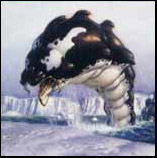 [card]Jokulmorder[/card], widely considered the biggest creature in the game today, tested positive for power-enhancing equipment, according to a report by MTGSalvation.com. Jokulmorder was discovered to have been using [card]Leonin Scimitar[/card], [card]O-Naginata[/card], and at one time [card]Golem Skin Gauntlets[/card], according to alleged equipment dealer [card]Steelshaper Apprentice[/card], who is currently standing trial. Jokulmorder, standing at 12/12 and poised to break [card]Krosan Cloudscraper[/card]’s record of 13/13 in a matter of years, declined to comment. Family and friends of lands sacrificed to Jokulmorder were visibly upset following the revelation.
[card]Jokulmorder[/card], widely considered the biggest creature in the game today, tested positive for power-enhancing equipment, according to a report by MTGSalvation.com. Jokulmorder was discovered to have been using [card]Leonin Scimitar[/card], [card]O-Naginata[/card], and at one time [card]Golem Skin Gauntlets[/card], according to alleged equipment dealer [card]Steelshaper Apprentice[/card], who is currently standing trial. Jokulmorder, standing at 12/12 and poised to break [card]Krosan Cloudscraper[/card]’s record of 13/13 in a matter of years, declined to comment. Family and friends of lands sacrificed to Jokulmorder were visibly upset following the revelation.
Jokulmorder was seen as a hero by many longtime Magic: The Gathering fans. After Cloudscraper tested positive for a [card]Vulshok Morningstar[/card] in 2003, fans turned to Jokulmorder as the savior of a game in shambles as a result of the ensuing equipment scandal. With Jokulmorder seen as the greatest “pure” creature left in the game, fans eagerly awaited the day he would grow bigger than Cloudscraper.
Now, that day may never come, if Jokulmorder meets the same fate as Cloudscraper. Numerous players refused to pay Cloudscraper’s upkeep cost; others cut him from their 93-card Green decks. In past years, Cloudscraper has chosen to stay out of the public eye, preferring to stay morphed.
This stunning leak leaves fans to root for [card]Autochthon Wurm[/card], the next in line to finally unseat [card]Phyrexian Dreadnought[/card] as the undisputed “largest creature ever.”
-
Linzards of the Linoast Releases Open Magic
(From the Linzards of the Linoast web site…)
Wizards of the Coast (WOTC, a subsidiary of Hasbro, NYSE: HAS) has long held a monopoly over the collectible card game known as Magic: The Gathering (MtG). We at Linzards of the Linoast have been working, along with several prominent MtG players, such as Trey Van Cleave, to produce an open source version of the popular game, one that combines all the features one would expect from the original, yet offered under the GPL. The result of this work is Open Magic!
The requirements for using Open Magic are as follows:
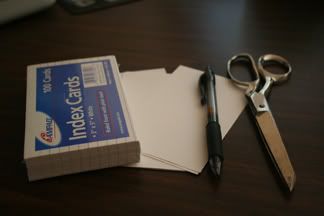

- 1 Collection of physical MtG cards
- 1 Pair household scissors
- 1 Pack standard issue index cards
- 1 Pen
- 1 Stapler pre-loaded with staples
- 1 Scanner
- 1 Computer capable of running Adobe Photoshop™
- 1 Copy of Adobe Photoshop™
- 1 Color Printer
- 1 Set of standard issue card sleeves to fit MtG cards
As you can see, the barrier to entry is very low!
In order to use Open Magic, simply do the following:
Step One:
Trace one of you regular MtG cards on one of your notecards, using some type of pen. To facilitate proper integration with standard MtG cards and sleeves, make sure to trace carefully! (Linzards of the Linoast recommends not consuming caffeine, alcohol, or other drugs at least 45 minutes prior to beginning tracing to ensure a steady hand.)
Step Two: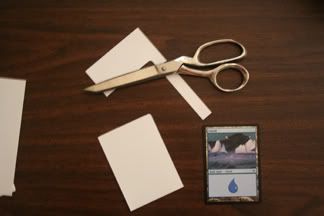
Cut out the card you just traced, using your scissors. Again, following the lines in essential for future compatibility.
Step Three:

Scan both the front of the card you are intending to use with Open Magic (this is why it is imperative that you own a collection of physical cards!), and the back of any card you choose.
Step Four:
Print out the card front and card back that you just scanned.
Step Five: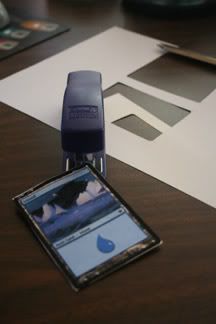
Cut out your front and back printouts, then staple them (make sure you face them the right way!) to the piece of notecard you cut out in Step Two. This is now your Open Magic card!
Step Six: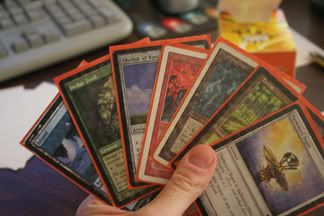
JK, there isn’t really a step six (:D)!! Check out this sample hand. It was generated using both the pre-existing, proprietary Magic: The Gathering cards, as well as our new Open Magic island. You can’t tell the difference, can you? We thought not!